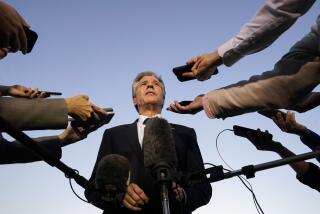Albright Urges Arab Allies to Back Anti-Hussein Drive
AMMAN, Jordan — With the man who will coordinate U.S. efforts to destabilize Iraq at her side, Secretary of State Madeleine Albright completed a three-nation tour of friendly Arab countries Thursday, appealing for at least tacit support in the campaign to bring down Iraqi President Saddam Hussein.
By introducing Frank Ricciardone to the leaders of Jordan, Saudi Arabia and Egypt, Albright stripped away any vestige of diplomatic ambiguity from Washington’s anti-Hussein program. The message was stark: We want the Iraqi president gone, one way or another, and you had better jump on the bandwagon.
Last week, Ricciardone was given the title of “special representative for the transition of Iraq,” a bureaucratically foggy description for an extraordinary, overt program to overthrow a foreign regime. The United States has undermined hostile governments before, but usually the work was done in secret by the CIA.
Washington wants Arab governments to go along with the effort, although U.S. officials acknowledge that some leaders are reluctant to talk in public about their support.
One senior official described a hostility to Hussein that was “deeper than I thought it was” after Albright’s talks with the Arab leaders. But he said the Arab leaders are uncomfortable with the openness with which the U.S. talks about its objectives.
Albright’s last stop in the Arab world--before heading for London and talks today on the conflict in Kosovo--was in Amman, Jordan, where she talked for 45 minutes with Crown Prince Abdallah, selected earlier this week by his ailing father, King Hussein, as the heir to the Hashemite throne.
Although Albright made her stock Iraq presentation to Abdallah, U.S. officials said her main objectives were to welcome the eldest son of the hospitalized monarch into the ranks of world leaders and to promise continuing support for Jordan even if King Hussein, long a favorite in Washington, succumbs to cancer.
“We are here to show support for Jordan and the crown prince,” Albright said.
Earlier Thursday, Albright visited the newly built Prince Sultan Air Base in Saudi Arabia, telling U.S. military personnel who enforce the Western-imposed “no-fly” zone over southern Iraq that armed pressure against Iraq’s Saddam Hussein must continue indefinitely.
Responding to the age-old soldier’s question “When will we go home?” Albright said: “This is unfortunately a longer-term project than anyone realized. . . . We don’t give up before the job is finished. It is not going to be real soon that you are out of here.”
The base, which sprawls over more than 200 square miles of Saudi desert, boasts state-of-the-art security measures designed to thwart car bombers or other terrorists. U.S. operations were moved to the base, about 50 miles south of Riyadh, the Saudi capital, after the 1996 Khobar Towers bombing, which killed 19 U.S. military personnel.
About 500 of the 4,000 Air Force, Army and Navy personnel at the base listened to Albright declare: “We are working actively toward the day when Iraq has a government that no longer oppresses its people.”
The Clinton administration appointed Ricciardone to head the anti-Hussein program in response to Congress, which demanded U.S. help for Iraqi exiles and appropriated $97 million to arm and equip them. However, U.S. officials said Ricciardone plans to do the job differently.
“Congress focused on a very particular approach, which was to arm outside political elements to be injected into Iraq,” an official said. “We scrubbed that approach. We thought it had serious problems.”
Instead, the official said, Ricciardone will try to deal with opponents of the regime wherever they can be found--inside or outside Iraq.
In response to a congressional mandate, however, Ricciardone named seven exile groups that could receive U.S. support. Two immediately said they want nothing to do with the United States.
And in Washington on Thursday, the top U.S. military commander in the Middle East expressed serious reservations about the effectiveness of the congressional directives.
“I’ve seen the effect of regime changes that didn’t quite come about the way we would have liked,” Gen. Anthony Zinni, commander in chief of the U.S. Central Command, told members of the Senate Armed Services Committee.
“The last thing we need is another rogue state,” Zinni said. “The last thing we need is a disintegrated, fragmented Iraq, because the effects on the region would be far greater, in my judgment, than a contained Saddam.”
Times staff writer Paul Richter in Washington contributed to this report.
--- UNPUBLISHED NOTE ---
In this and some other stories, King Abdullah II of Jordan is referred to as Crown Prince Abdallah of Jordan.
--- END NOTE ---
More to Read
Sign up for Essential California
The most important California stories and recommendations in your inbox every morning.
You may occasionally receive promotional content from the Los Angeles Times.










